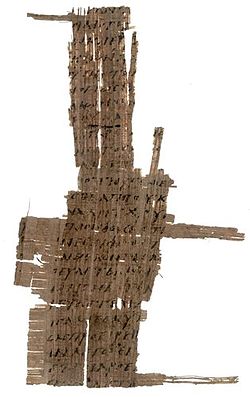Galatians 4 is the fourth chapter of the Epistle to the Galatians in the New Testament of the Christian Bible. It is authored by Paul the Apostle for the churches in Galatia, written between 49 and 58 CE.[1] This chapter contains one of Paul's richest statements in Christology.[2]
| Galatians 4 | |
|---|---|
 A page showing Galatia 1:2-10 on Papyrus 51, ca. AD 400. | |
| Book | Epistle to the Galatians |
| Category | Pauline epistles |
| Christian Bible part | New Testament |
| Order in the Christian part | 9 |
The original text was written in Koine Greek. This chapter is divided into 31 verses.
Some early manuscripts containing the text of this chapter are:
In this part, Paul uses the illustration that an heir is in a better position than a slave to inherit an estate one day.[2] God sent Jesus as his heir to "redeem those under the law", so "all who are in Christ Jesus might receive adoption."[2]
This part exposes Paul's fear that the Galatians, who before becoming Christians were enslaved to idols, now after being believers of Christ would want to be enslaved again, by meticulously observing the Jewish calendar rituals.[11]
The verses 12–20 display Paul's "passionate concern" for the spiritual condition of the Galatians, whom he addressed as 'friends' or 'brethren' (verse 12) and 'my little children' (verse 19), and his wish to be personally present in their midst.[11]
This part is considered as "Paul's striking final argument" to contrast the children born of 'a slave woman' (Hagar), that is "to be subject to the law", with the children born of 'a free woman' (Sarah) 'through the promise' and 'according to the Spirit';[12] a contrast between "law" and "grace".[13]
Citation from Isaiah 54:1[16]